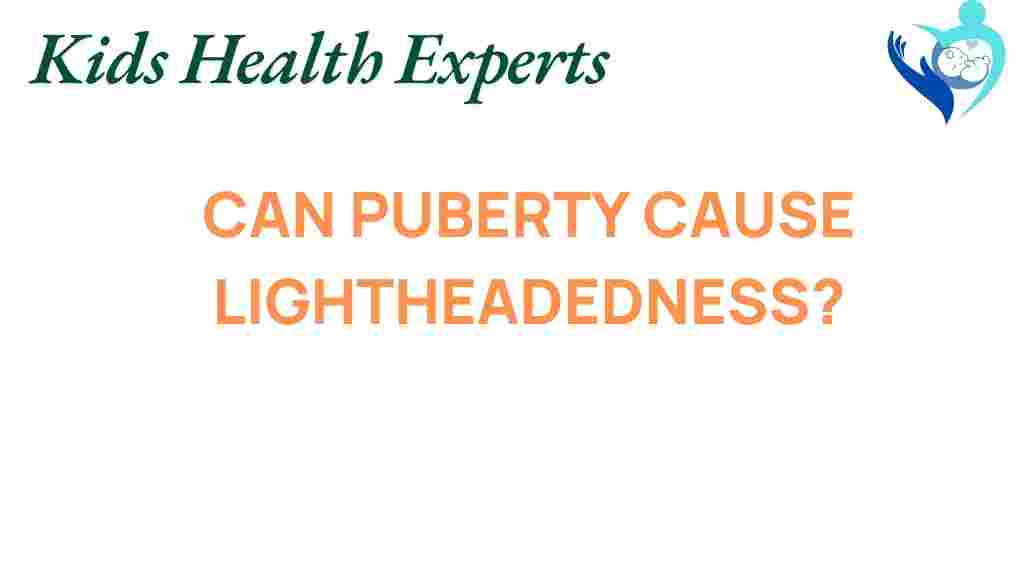Is Lightheadedness a Hidden Side Effect of Puberty?
Puberty is a critical phase in human development, marked by numerous physical, emotional, and hormonal changes. Adolescence is often a time of rapid growth and transformation, but it can also come with unexpected health symptoms. One such symptom that many teenagers may experience is lightheadedness. This article explores the connection between puberty and lightheadedness, providing insights into its causes, symptoms, and ways to manage this often-overlooked issue.
Understanding Puberty and Its Effects
Puberty typically begins between ages 9 and 14 and can last several years. It is characterized by:
- Physical changes such as growth spurts and development of sexual characteristics.
- Emotional and psychological shifts due to hormonal fluctuations.
- Increased independence and social interactions.
During this time, the body undergoes significant hormonal changes. Hormones like estrogen and testosterone surge, influencing various bodily functions. While these changes are normal, they can lead to some unexpected symptoms, including lightheadedness. Understanding how these symptoms manifest can help teens and parents navigate this complex period.
Lightheadedness: What Is It?
Lightheadedness is often described as feeling faint or dizzy. It can range from a mild sensation to a more severe feeling that may lead to fainting. Common causes of lightheadedness during adolescence can include:
- Rapid growth spurts
- Hormonal changes
- Dehydration
- Low blood sugar levels
- Stress and anxiety
Understanding these factors is essential in addressing the symptoms and ensuring overall wellbeing during puberty.
The Connection Between Hormones and Lightheadedness
Hormonal changes during puberty can significantly impact a teen’s health. The surge in hormones can affect the cardiovascular and nervous systems, potentially leading to lightheadedness. Here’s how:
- Blood Pressure Fluctuations: Hormonal changes can cause blood vessels to constrict or dilate, leading to fluctuations in blood pressure. This can result in dizziness or lightheadedness.
- Increased Heart Rate: As the body adjusts to new hormone levels, heart rates may increase, which can cause feelings of lightheadedness, especially during physical activity.
- Dehydration: Teens may not drink enough water, especially during growth spurts or after physical activities. Dehydration can lead to decreased blood volume, causing lightheadedness.
Common Symptoms of Lightheadedness During Adolescence
Recognizing the symptoms of lightheadedness is crucial for teens and parents. Common symptoms include:
- Feeling faint or weak
- Nausea
- Blurred vision
- Confusion or difficulty concentrating
- Increased heart rate
If these symptoms occur frequently or are accompanied by other concerning signs, it is essential to consult a healthcare professional.
When to Seek Medical Help
While lightheadedness can be a common experience during puberty, it is important to know when to seek medical advice. Consider consulting a healthcare provider if:
- The lightheadedness is severe or persistent.
- It is accompanied by fainting or loss of consciousness.
- There are other concerning symptoms, such as chest pain or shortness of breath.
- Lightheadedness occurs frequently and affects daily activities.
Managing Lightheadedness During Puberty
Fortunately, there are several strategies teens can adopt to help manage lightheadedness during puberty:
- Stay Hydrated: Encourage teens to drink plenty of water throughout the day. Proper hydration can help maintain blood volume and prevent dizziness.
- Eat Regularly: Consuming balanced meals and snacks can help maintain stable blood sugar levels, reducing the risk of lightheadedness.
- Avoid Sudden Movements: Encourage teens to rise slowly from sitting or lying positions to prevent sudden drops in blood pressure.
- Manage Stress: Practicing relaxation techniques such as deep breathing, yoga, or mindfulness can help reduce stress-related lightheadedness.
- Regular Check-ups: Routine health check-ups can help monitor any underlying health issues that may contribute to lightheadedness.
Step-by-Step Process to Address Lightheadedness
If a teen experiences lightheadedness, here’s a step-by-step process to follow:
- Assess the Situation: Determine if the lightheadedness is isolated or accompanied by other symptoms.
- Take a Break: If feeling lightheaded during an activity, take a moment to sit down and rest.
- Hydrate: Drink some water to ensure proper hydration.
- Snack: Eat a light snack, especially if it has been a while since the last meal.
- Monitor Symptoms: Keep track of how often lightheadedness occurs and any other accompanying symptoms.
- Consult a Healthcare Provider: If symptoms persist, seek advice from a medical professional.
Additional Tips for Wellbeing During Adolescence
Maintaining overall health and wellbeing during puberty is essential. Here are some additional tips:
- Engage in Regular Physical Activity: Exercise can improve circulation and boost overall health.
- Get Enough Sleep: Adequate sleep is crucial for physical and mental health during this growth period.
- Limit Caffeine: Reducing caffeine intake can help prevent dehydration and jitteriness.
- Build a Support Network: Encourage open communication with friends and family about any health concerns.
Conclusion
Lightheadedness can be a hidden side effect of puberty, stemming from various factors including hormonal changes, dehydration, and blood pressure fluctuations. Understanding the connection between puberty and lightheadedness is essential for promoting teen health and wellbeing. By staying hydrated, eating properly, and managing stress, adolescents can mitigate the experience of lightheadedness. If symptoms persist or worsen, seeking professional medical advice is vital.
For more information on teen health and wellness, visit this resource. Understanding the complexities of puberty can empower teens and parents to navigate this transformative phase more effectively.
In summary, while lightheadedness can be a concerning symptom, it is often manageable with proper care and awareness. Emphasizing the importance of health during adolescence can lead to a more positive experience during this critical life stage.
This article is in the category Conditions and created by KidsHealthExperts Team
